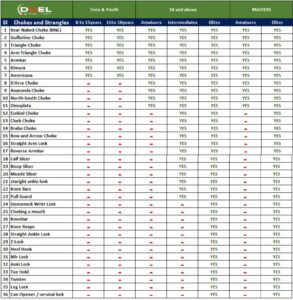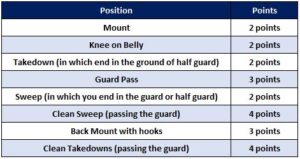DUEL BJJ INFO
Duel Tournament Format
YOUTH & TEEN
STYLE:- Points & submission
TYPE :- Double elimination
ADULTS & MASTERS
STYLE:- Submission Only
TYPE :- Double elimination
Age Level in Duel
Under 10 :- 08 years to 09 years 11 months 30 days
Under 12 :- 10 years to 11 years 11 months 30 days
Under 14 :- 12 years to 13 years 11 months 30 days
Under 16 :- 14 years to 15 years 11 months 30 days
Under 18 :- 16 years to 17 years 11 months 29 days
Adults :- 18 years to 35 years 11 months 29 days
Masters :- 36 years & Above
Skill Level in Duel
YOUTH & TEEN
8 years to under 18
ADULTS 18 years to under 36
1) AMATEUR
2) ELITE (4 to 5 years + experience / Purple belts and above / professional MMA fighters falls in this Category)
MASTERS 36 years and Above
1) AMATEUR
2) ELITE (Masters who are in Purple belts & above will compete in Duel Elite rules.
Weight Classes
YOUTH & TEEN
8 to under 10
Boys
-40, -48, 48+
Girls
-40, -48, 48+
10 to under 12
Boys
-44, -52, 52+
Girls
-44, -52, 52+
12 to under 14
Boys
-48, -56, 56+
Girls
-44, -52, 52+
14 to under 16
Boys
-48, -56, -68, 68+
Girls
-48, -56, 56+
16 to under 18
Boys
-52, -60, -68, 68+
Girls
-48, -56, 56+
ADULTS
Amateurs
Men
-57, -65, -75, -87 & Absolute
Women
-52, -60, 60+
Elite
Men
-65, -75, -87 & Absolute
Women
-52, -60, 60+
MASTERS
Amateurs
Men
-75 & Absolute
Women
-65 & Absolute
Note: - MASTERS who are in Purple Belts & Above will compete in DULE ELITE Rule.
Time Limits
8 to under 15 years age group (Point/Submission)
- QUALIFYING ROUNDS - 3min
- FINALS - 5min
15 to under 18 years age group (Point/Submission)
- QUALIFYING ROUNDS - 4min
- FINALS - 6min
18 years to Under 36 (Submission only)
AMATUERS
- QUALIFYING ROUNDS - 5min
– Each fighter gets up to 3 overtime rounds, each lasting 1 minute. - FINALS - 8min
– Each fighter gets up to 3 overtime rounds, each lasting 1 minute.
ELITE
- QUALIFYING ROUNDS - 8min
– Each fighter gets up to 3 overtime rounds, each lasting 1 minute. - FINALS - 10min
– Each fighter gets up to 3 overtime rounds, each lasting 1 minute.
Master 36 years & above (Submission only)
AMATUERS
- QUALIFYING ROUNDS - 5min
– Each fighter gets up to 3 overtime rounds, each lasting 1 minute. - FINALS - 8min
– Each fighter gets up to 3 overtime rounds, each lasting 1 minute.
ELITE
- QUALIFYING ROUNDS - 8min
– Each fighter gets up to 3 overtime rounds, each lasting 1 minute. - FINALS - 10min
– Each fighter gets up to 3 overtime rounds, each lasting 1 minute.
Duel Standard Illegal Moves
Top 11 Illegal moves in Duel:
- Spinal Locks without the choke: Any type of multiple joint lock that applies pressure to the spinal column, including twisters, is prohibited in competitions.
- Small Joint Manipulation: Hyperextending opponents’ hand or toe joints is an illegal technique, as it can result in long-term injuries.
- Slams: All types of slams are illegal in all divisions. All forms of slams, whether from the closed guard, from the back, or from the armbar, are illegal.
- Backward Finger Bending: Backward bending of fingers is not allowed at all. However, if you are going to use it for a wrist lock, you should be holding all four fingers. Basically, this move is related to small joint manipulation.
- Butt Scooting: Butt scooting, sitting on the ground without engaging from standing, is discouraged in DUEL BJJ and can lead to penalties.
- Unsportsmanlike Conduct: No spitting, slapping, biting, fish hooking, holding T-shirts, using abusive language, eye-gouging, hair pulling, or intentionally targeting illegal areas such as the groin.
DUEL BJJ RULES & REGULATIONS
Duel: Legal Submissions Guide

General Guidelines for Submissions in BJJ
- Safety First: Always apply submissions with control and give your opponent the opportunity to tap out.
- Respect the Tap: Once your opponent taps (either physically or verbally), immediately release the submission to prevent injury.
- Technical Mastery: Ensure you understand the mechanics of the submission to apply it effectively and safely.
Duel: Scoring System

- Takedown or Throw (2 points)
- Successfully bringing your opponent to the ground from a standing position and maintaining control.
- Sweep (2 points)
- Reversing the position from being on the bottom in guard or half-guard to being on top, gaining control & maintaining control.
- Knee on Belly (2 points)
- Placing a knee on the opponent's torso while the other leg is in a standing position, maintaining control for a few seconds.
- Guard Pass (3 points)
- Successfully passing the opponent's guard and establishing a dominant position (side control, mount, etc.).
- Mount (2 points)
- Achieving a full mount position where the competitor is sitting on the opponent's torso with both knees on the ground, maintaining control.
- Back Control (3 points)
- Taking the opponent's back with both hooks (feet) in and maintaining control, often with the opponent's back on your chest & maintaining control.
Overtime Rule
- If no submission is achieved within the round time, the match moves into "Overtime."
- A coin toss will decide which fighter starts first.
- Each fighter gets up to 3 overtime rounds, each lasting 1 minute.
- Fighters will choose one of two dominant starting positions:
- Option 1: Back Control – Starting with a full seatbelt grip and both hooks in.
- Option 2: Spiderweb – Starting in an armbar-ready position.
- Fighters take turns starting from these dominant positions.
- The winner is determined by either the fastest submission time or the fastest escape time.
Rules for Penalties and Disqualification
1. Stalling
2. Fleeing the Mat or Action
3. Grabbing Illegal Areas of the Gi or Body
4. Unintentional Fouls
5. Inactivity in Guard or from a Dominant Position
Description: Illegal actions include techniques such as knee reaping (crossing the leg over the opponent’s knee in a way that could cause injury), slamming to escape a submission, or using moves prohibited at certain age or belt levels (like heel hooks in specific divisions), among others.
6. Unnecessary Outbursts or Behavior
Note: An oral warning is given first, followed by point deductions for repeated offenses. In more severe cases, immediate negative points or potential disqualification may be issued.
